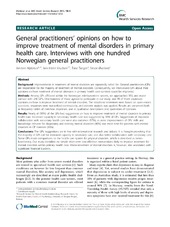| dc.description.abstract | Background: Improvements in treatment of mental disorders are repeatedly called for. General practitioners (GPs) are responsible for the majority of treatment of mental disorders. Consequently, we interviewed GPs about their opinions on how treatment of mental disorders in primary health care contexts could be improved. Methods: Among GPs affiliated within the Norwegian reimbursement system, we approached 353, and made contact with 246 GP's. One-hundred of these agreed to participate in our study, and 95 of them expressed opinions on how to improve treatment of mental disorders. The telephone interviews were based on open-ended questions, responses were transcribed continuously, and content analysis was applied. Results are presented both as frequency tables of common responses, and as qualitative descriptions and quotations of opinions. Results: Nearly all (95%) of the GPs had suggestions on how to improve treatment of mental disorders in primary health care. Increased capacity in secondary health care was suggested by 59% of GPs. Suggestions of improved collaboration with secondary health care were also common (57%), as were improvements of GPs' skills and knowledge relevant for diagnosing and treating mental disorders (40%) and more time for patients with mental disorders in GP contexts (40%). Conclusions: The GPs' suggestions are in line with international research and debate. It is thought-provoking that the majority of GPs call for increased capacity in secondary care, and also better collaboration with secondary care. Some GPs made comparisons to the health care system for physical disorders, which is described as better-functioning. Our study identified no simple short-term cost-effective interventions likely to improve treatment for mental disorders within primary health care. Under-treatment of mental disorders is, however, also associated with significant financial burdens. | en_US |

